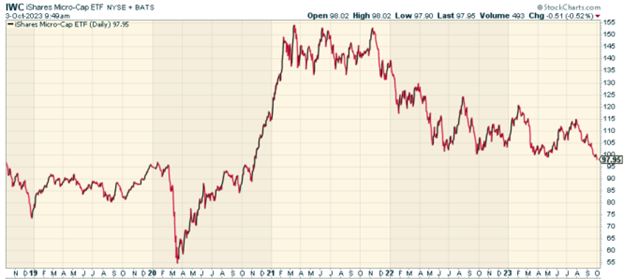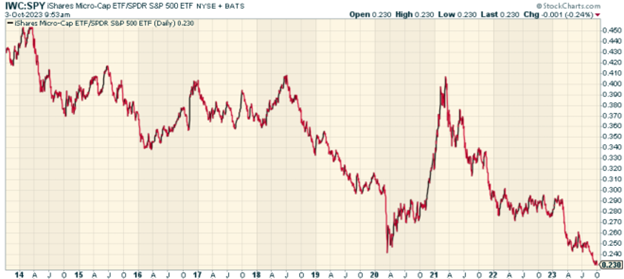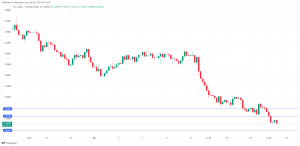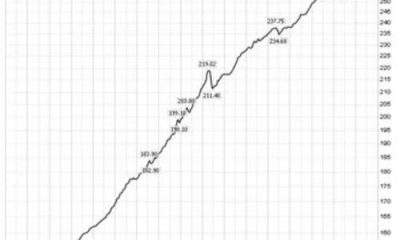Economics
Micro-Cap Stocks Prove We’re Not in a New Bull Market
I’ve been hammering the point for some time now that the “new bull market” narrative is nonsense.
A true new bull market should be driven by cyclical…
I’ve been hammering the point for some time now that the “new bull market” narrative is nonsense.
A true new bull market should be driven by cyclical sectors in companies of ALL sizes, not just a select few mega-cap names. Look at the iShares Micro-Cap ETF (NYSEARCA:IWC), which is a good proxy for micro-cap stocks. Does this look like a new bull market to you?
 Source: Chart courtesy of StockCharts.com
Source: Chart courtesy of StockCharts.com
When a rising tide does not lift all boats, everyone drowns. And micro-cap stocks are drowning now.
What Micro-Cap Stocks Are Telling Us Right Now
Micro-cap stocks refer to the shares of public companies with relatively small market capitalizations, typically within the range of $50 million to $300 million. These companies, although smaller in size, often offer higher growth potential. This makes them an exciting option for investors willing to embrace higher risk for potentially higher returns when IN a legitimate new bull market. The fact that micro-cap stocks remain in a broader downtrend tells you everything you need to know about true risk sentiment beneath the surface.
When we compare the performance of IWC to the S&P 500, the disparity is evident. Micro-caps are trading at their lowest levels relative to the S&P 500 in over a decade. This ratio has made a complete roundtrip since the post-Covid-19 reopening surge, and for all we know, can continue to lag.
 Source: Chart courtesy of StockCharts.com
Source: Chart courtesy of StockCharts.com
No one is talking about this, and this is an enormous red flag. It’s more than just a chart. The financial health of many micro-cap companies is precarious. To fund growth, they need debt, which is considerably more expensive than we’ve seen in decades. Many of these companies are pre-revenue or unprofitable. Talk about zombie companies? The number of micro-cap companies that may not survive is vastly underappreciated as a risk.
Micro-cap stocks have historically performed better when the Federal Reserve adopts a loose monetary policy, characterized by lower interest rates and increased money supply. This is because smaller companies often depend on borrowed money for growth and expansion as mentioned. Therefore, lower interest rates can reduce their borrowing costs, boosting profitability and share prices. I suspect the “higher for longer narrative” will reverse if we are on the verge of a tail event for stocks. That could be the time to load up on these types of companies. But the bigger question is what the message of micro-caps has on broader risk sentiment.
The Bottom Line
The bottom line is simple. While surface-level indicators might suggest a new bull market, a closer examination of the performance of micro-cap stocks, as represented by the IWC ETF, paints a different picture. The underperformance of IWC, coupled with the lack of risk appetite among investors and unfavorable monetary conditions, suggests that the current market is fooling everyone.
I have gone on record many times saying we are still in a bear market, and that a credit event ends it. If I’m right, micro-cap stocks should be the first to rally the hardest. Not yet.
On the date of publication, Michael Gayed did not hold (either directly or indirectly) any positions in the securities mentioned in this article. The opinions expressed in this article are those of the writer, subject to the InvestorPlace.com Publishing Guidelines.
The Lead-Lag Report is provided by Lead-Lag Publishing, LLC. All opinions and views mentioned in this report constitute our judgments as of the date of writing and are subject to change at any time. Information within this material is not intended to be used as a primary basis for investment decisions and should also not be construed as advice meeting the particular investment needs of any individual investor. Trading signals produced by the Lead-Lag Report are independent of other services provided by Lead-Lag Publishing, LLC or its affiliates, and positioning of accounts under their management may differ. Please remember that investing involves risk, including loss of principal, and past performance may not be indicative of future results. Lead-Lag Publishing, LLC, its members, officers, directors and employees expressly disclaim all liability in respect to actions taken based on any or all of the information on this writing.
Michael A. Gayed is the Publisher of The Lead-Lag Report, and Portfolio Manager at Tidal Financial Group, an investment management company specializing in ETF-focused research, investment strategies and services designed for financial advisors, RIAs, family offices and investment managers.
InvestorPlace readers that are new subscribers to the The Lead-Lag Report can receive a 30% discount.
More From InvestorPlace
- ChatGPT IPO Could Shock the World, Make This Move Before the Announcement
- Musk’s “Project Omega” May Be Set to Mint New Millionaires. Here’s How to Get In.
- The Rich Use This Income Secret (NOT Dividends) Far More Than Regular Investors
The post Micro-Cap Stocks Prove Weâre Not in a New Bull Market appeared first on InvestorPlace.
monetary
reserve
policy
money supply
interest rates
monetary policy

Argentina Is One of the Most Regulated Countries in the World
In the coming days and weeks, we can expect further, far‐reaching reform proposals that will go through the Argentine congress.
Crypto, Crude, & Crap Stocks Rally As Yield Curve Steepens, Rate-Cut Hopes Soar
Crypto, Crude, & Crap Stocks Rally As Yield Curve Steepens, Rate-Cut Hopes Soar
A weird week of macro data – strong jobless claims but…
Fed Pivot: A Blend of Confidence and Folly
Fed Pivot: Charting a New Course in Economic Strategy Dec 22, 2023 Introduction In the dynamic world of economics, the Federal Reserve, the central bank…



















